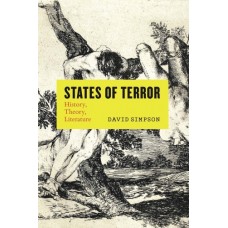Being in Terror, Being as Terror
Pol Pot, Mao, Lenin, Stalin, and Hitler have all been ranged in a roster of competitive villainy as dispensers of terrors.
States of Terror: History, Theory, Literature
by David Simpson
For much of the twentieth century terror was understood in the West as the property of states, but they were other states, designated as enemies, not us. Pol Pot, Mao, Lenin, Stalin, and Hitler have all been ranged in a roster of competitive villainy as dispensers of terrors. These widely recognized atrocities served to displace any easy recognition of terrors deployed by, for example, Allied airplanes over Germany, British counterinsurgency operations against the dissolving empire, or US- sponsored interventions in Central and South America and Vietnam. With the turn to violence among national liberation movements (Kenya, Malaya, Palestine, Algeria, and Ireland, among others), it became opportune to designate terrorism as their defining practice, and terror as its object. But such terrorism has always been punctilious and spasmodic. Even when it is the product of a long-term cause that persists through time, acts of violence have to be very regular indeed to create a pervasive sense of terror. FLN (Algeria), ETA (Basque Country), and IRA (Ireland) bombings arguably came closest to this but never succeeded in pressuring large populations into the sort of radical insecurity that is best described as a state of terror. Conversely, populations under occupation or surveillance by overwhelming military force are more susceptible to terror. Such force has always been the property of nation-states.
How have we come to depend so greatly on the words terror and terrorism to describe broad categories of violence? David Simpson offers here a philology of terror, tracking the concept’s long, complicated history across literature, philosophy, political science, and theology—from Plato to NATO. Introducing the concept of the “fear-terror cluster,” Simpson is able to capture the wide range of terms that we have used to express extreme emotional states over the centuries—from anxiety, awe, and concern to dread, fear, and horror. He shows that the choices we make among such words to describe shades of feeling have seriously shaped the attribution of motives, causes, and effects of the word “terror” today, particularly when violence is deployed by or against the state. At a time when terror-talk is widely and damagingly exploited by politicians and the media, this book unpacks the slippery rhetoric of terror and will prove a vital resource across humanistic and social sciences disciplines.
Categories:
Society, Politics & Philosophy - Government & Politics
Year:
2019
Publisher:
The University of Chicago Press
Language:
English
Pages:
285
ISBN 10:
022660022X
ISBN 13:
9780226600222
File:
PDF, 1.98 MB
What does it mean to live in and according to terror?
- Product Code: States of Terror
- Availability: In Stock
-
$0.00
- Ex Tax: $0.00
Tags terror talk, terrorism, dispensers of terrors, villainy, crime
